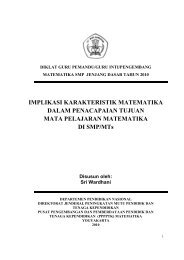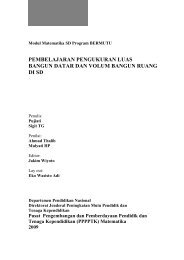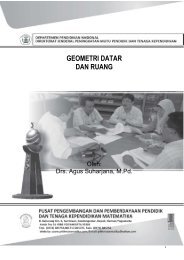25 Biggest Mistakes Teachers Make and How to Avoid Them
25 Biggest Mistakes Teachers Make and How to Avoid Them
25 Biggest Mistakes Teachers Make and How to Avoid Them
You also want an ePaper? Increase the reach of your titles
YUMPU automatically turns print PDFs into web optimized ePapers that Google loves.
158 Personality <strong>and</strong> Professionalism<br />
<strong>to</strong> let go of the initial omission. The<br />
student apparently internalized the<br />
slight, nurtured it, <strong>and</strong> hung on <strong>to</strong> it<br />
for years. There is no evidence that<br />
the teacher was aware of the impact<br />
of the omission.<br />
Astute teachers know the importance<br />
of apologizing <strong>to</strong> a student<br />
when they make mistakes. I think it<br />
is important <strong>to</strong> preface that apology<br />
with an acknowledgment that teachers<br />
make honest mistakes <strong>and</strong> <strong>to</strong><br />
assure the student that it was not<br />
personal. To soothe ruffled feathers,<br />
teachers can ask students what else<br />
they can do <strong>to</strong> make them feel better.<br />
SCENARIO 20.6<br />
To Err Is Human, <strong>to</strong> Admit It Is Divine<br />
When I was in sixth grade my English teacher gave me a C on a project. That isn’t a bad<br />
grade, it could have been worse, but I disagreed with it. The assignment was <strong>to</strong> make<br />
a poster showing the difference between “good” <strong>and</strong> “well.” He said I got the concepts<br />
backward <strong>and</strong> gave me a C. I was so sure I had them straight. I remember every week<br />
in elementary school telling my teacher, “I don’t feel good,” <strong>and</strong> she would say, “Well,<br />
you don’t feel well.”<br />
And so I was positive that my picture of a man’s face that I put on my poster with a<br />
thermometer <strong>and</strong> sad, droopy, watery eyes saying, “He doesn’t feel well” was correct.<br />
Wrong, my teacher said. I still believe that I was correct. Even <strong>to</strong>day, I am confused as<br />
<strong>to</strong> how I feel. So I mostly say I have a headache or my s<strong>to</strong>mach hurts. And I seldom correct<br />
others on their use of good <strong>and</strong> well, fearing I might correct them the wrong way<br />
<strong>and</strong> traumatize them for life. I am not really traumatized, but I will never forget all of<br />
my hard effort I put in<strong>to</strong> that poster <strong>and</strong> joy I felt, thinking I finally used the word correctly,<br />
only <strong>to</strong> find out I was wrong <strong>and</strong> had been misguided.<br />
This is a scenario of “the student<br />
is right <strong>and</strong> the teacher is<br />
wrong.” Well can be used as an adjective<br />
or adverb <strong>to</strong> mean in good<br />
health, satisfac<strong>to</strong>ry, or <strong>to</strong> appear well<br />
dressed; whereas, good is only used<br />
as an adjective <strong>and</strong> it is never used <strong>to</strong><br />
modify a verb (Warriner & Griffith,<br />
1977). Either the teacher was unaware<br />
that he was wrong or was reluctant<br />
<strong>to</strong> admit that he was wrong.<br />
Erroneously, some teachers believe<br />
that because they are the teachers,<br />
they must know all of the answers all<br />
of the time <strong>and</strong> never make mistakes.<br />
They think that if they admit that<br />
they are wrong, their admission is a<br />
sign of weakness that undermines<br />
their credibility.<br />
The smart, confident teacher realizes<br />
that saying “I don’t know” <strong>and</strong><br />
being ignorant for the moment is<br />
preferable <strong>to</strong> never saying “I don’t<br />
know” <strong>and</strong> remaining ignorant for all<br />
time. When children are so sure they<br />
are right, effective teachers investigate<br />
<strong>and</strong> tell them that teachers make<br />
mistakes <strong>and</strong> that sometimes the student<br />
is right. If the student is right,<br />
these teachers readily admit their<br />
errors or shortcomings. <strong>Teachers</strong> can<br />
save face <strong>and</strong> validate the child by<br />
thanking the child for the gift of the<br />
new knowledge.





